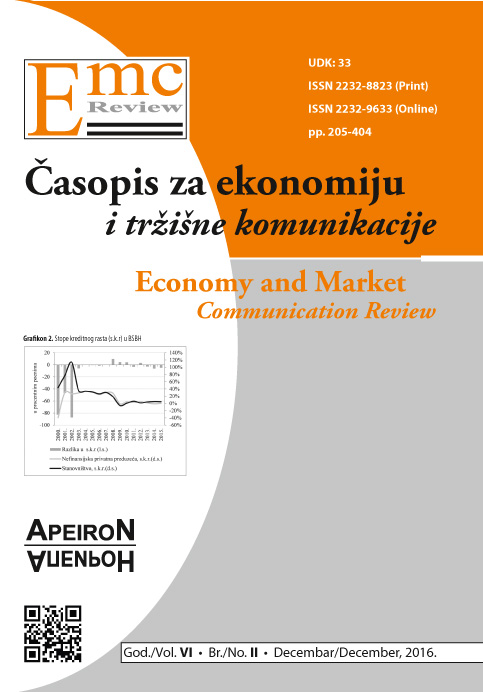VERTICAL MANAGEMENT IN THE FUNCTION OF SALES // VERTIKALNI MENADŽMENT U FUNKCIJI PRODAJE
DOI:
https://doi.org/10.7251/EMC1602274LAbstract
In this paper we have exposed the managerial vertical integration between production and sales companies in the functional marketing channels in order to successfully meet the needs of the end customer and higher profits for all members in the vertical chain. The classic principle of domination of marketing and business logistics represents an acceptable requirements in coordination, in terms of increased integration between production and sales companies. In the exposed situation, one-sided, insulated access strategies of marketing in terms of classical domination of marketing placement company represents an outdated approach. Often have graded covered value concepts of coordination raised the issue, which integrating principle should be taken into account when considering the relationship between the level of channel marketing to marketing procurement, business logistics and marketing investments. Such integration activities, which touch upon all levels of functional systems marketing channels, while procedural observation leads to the integrated process of creating the basic properties of a combination of marketing mix from production to the customer. Forming a connected, but also customer-oriented processes in the implementation of vertically and horizontally integrated concept of “package” offering all organizational units is the task of management in the process of creating usage and traffic levels of its components. In its framework a coordination can be established of organizational units integrated gradually covered by a set of values, which is no longer under control and domination by marketing investments. This set of features to create a combination of marketing mix includes complex, more functional relationships of exchange, which coordinates the “brain” for the definition of desire. Such a center is installed in the management of the key features of the “package” offer of production to customers, so that we can talk about a simple system of management of vertical co-operative marketing. The system of domination under the vertical cooperation increases the number of seats between the company and implemented functions through process-oriented mode in a series of properties to create a combination of marketing mix. Consequently, vertical cooperation follows the motive of restructuring business processes with respect to natural, customer-based process at firsthand. The multistage vertical distribution management system seems like a successfully agreed principle of coordination. It fits the motif of the restructuring of business processes, in order to increase the effective creation of a series of use and traffic combination of marketing mix. Organizational definition of such vertical cooperation can be realized through various concepts such as total quality management and customer proximity. At the same time, it doesn not lead to the integration of present organizational units, but only to their co-operative harmonization. In these circumstances the approach inherent MTK (Total Quality Management) becomes very prominent, in order to place a quality cooperative marketing and business logistics between production and retail companies. As an integrative principle of successful restructuring while supporting the total effectiveness of a functional system of marketing channels, we shall mention the pervasive concept of management oriented customers. The realization of the concept in functional systems of marketing channels indicates the need for the establishment of cooperative forms. In a tiered system of marketing channel tehere is a constant need for the whole company organizational units of production, trade and services (intermediaries in the distribution, service organizations in marketing), so there is the question of institutionalizing their coordination. In cooperation between the large manufacturing and retail companies including the internal business process-oriented organization management marketing mix investments, a powerful team in charge of the process is formed. If you include more organizational units in cooperation on customer-oriented management, a multilateral harmonizationmust follow, a company in the network values are referred to a kind of coordination. Such a network of companies is formed as an organizational form suitable just for medium-sized companies with complementary “package” offer, or a combination of its components which would meet the complex problems of customers. In this case, a coordination occurs of at least two participants in a functional channel marketing, so that in this case we can speak of his network. The management system in such a network takes, as a rule, the key company as a switchboard for defining desire. However, on this occasion the management system can be done through a team process, which consists of associate companies represented in the network to create the basic properties of a combination of marketing mix. A functional network marketing channel represents a successful harmonized form of vertical cooperation in highly complicated reproduction. By its integration, in particular, medium-sized companies can solve the problem by establishing a critical mass of cooperation. Thus opens a real space for an objective consideration of the effective management of relationships with customers and within its framework the role of retail and manufacturing companies. On the other hand, on the basis of exposed indisputable facts it can be stated that there is no rationalization and successful growth and development, if sales and production companies do not use a reliable and modern information technology for the establishment of cooperation in the framework of the management system. That way they can quickly react to the “critical mass”. Therefore, selling the company should be concentrated on the sensor reliable coverage of sales, automatic messaging and continuously promoting the development of products. Manufacturers need to commit to synchronizing the production, reliable unfolding operations and integrated product delivery. The aim of the strategy is the implementation of supply information and logistic instruments and measures to the real range offered to consumers, at the right place at the right time, in the right quantity, the right quality and at the lowest cost. Supply should be demand-oriented in the context of effective relationships with consumers.Downloads
Published
2017-01-03
Issue
Section
Чланци
